Art World
Artist Matt Gagnon Wields Light and Shadow in an Illuminating New Collaboration with Gaggenau
The architect and artist is debuting new work to celebrate the luxury kitchen appliance brand's new Miami Design District showroom.
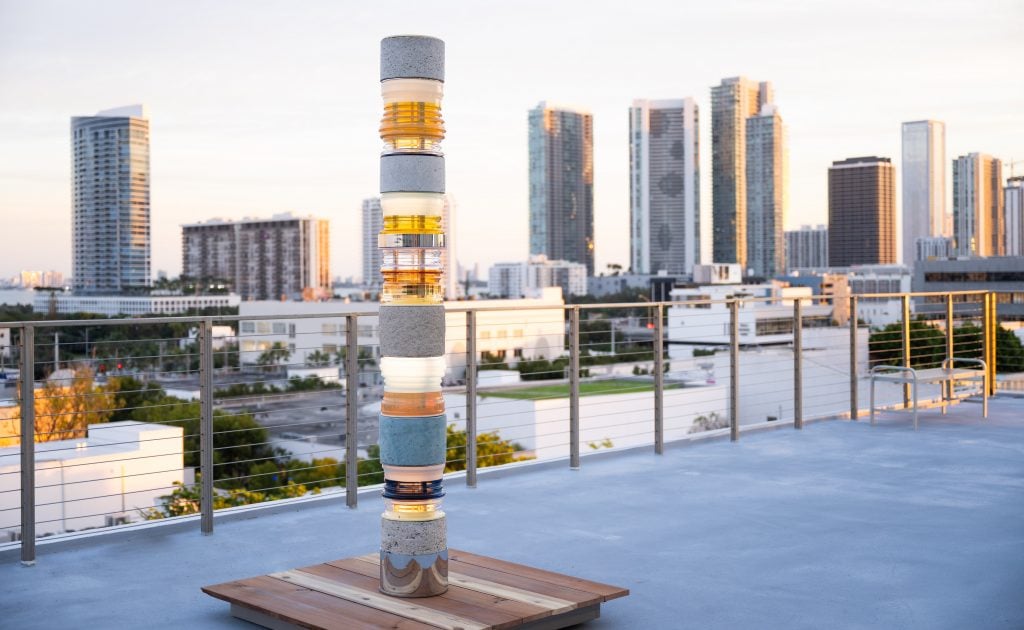
The architect and artist is debuting new work to celebrate the luxury kitchen appliance brand's new Miami Design District showroom.

William Van Meter in Partnership with Gaggenau

By stacking rings of disparate materials, Matt Gagnon achieves total equilibrium with his entrancing “Light Stack” sculptures. They’re just as much a study of form and texture as they are illumination. With quiet stoicism, the Los Angeles-based artist will gracefully deflect if you refer to them as lamps.
“I mean, they are a light source,” he says hesitatingly and adds, “but in the sense of being functional, I don’t care if you can read by them or not. It’s how the colors feel in a space. They look very precise and predictable when making them in the studio, but I never know what they’re going to look like until they’re plugged in and turned on.” Gagnon, who studied architecture and ballet at Cornell University, has similar reticence to labeling himself. “I struggle,” he says. “It terrifies me, and I ask, am I comfortable in that category?” Gagnon’s practice is a singular amalgamation that marries fine art and product design.
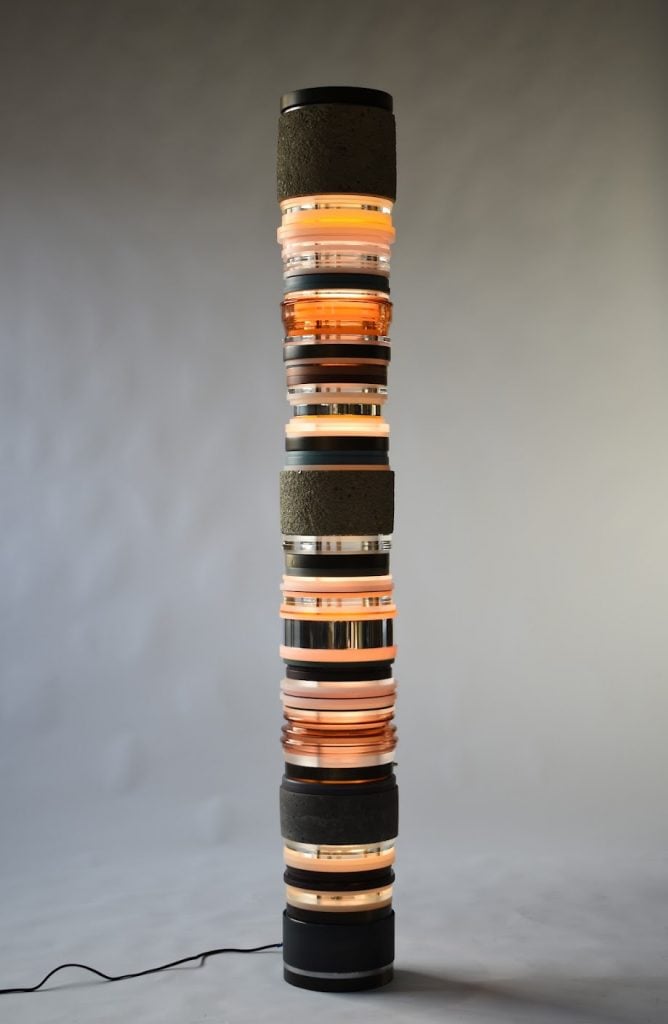
Matt Gagnon, Gray Blue (2023). Courtesy of the artist.
This week, the artist is debuting five brand-new works—a veritable cross-section of his oeuvre—to celebrate the opening of luxury kitchen appliance brand Gaggenau‘s new flagship in the Miami Design District. (You can see his sculpture Gray Blue at Gaggenau’s showroom by reaching out to [email protected] or calling Rose Lantz at 717-278-0519 to make an appointment.)
Besides the stellar “Light Stack” totem poles, Gagnon is supplying abstract steel sculptures and his “volcanoes”—calm, otherworldly textured spheres of mortar and stone that belie a vivid glass interior.
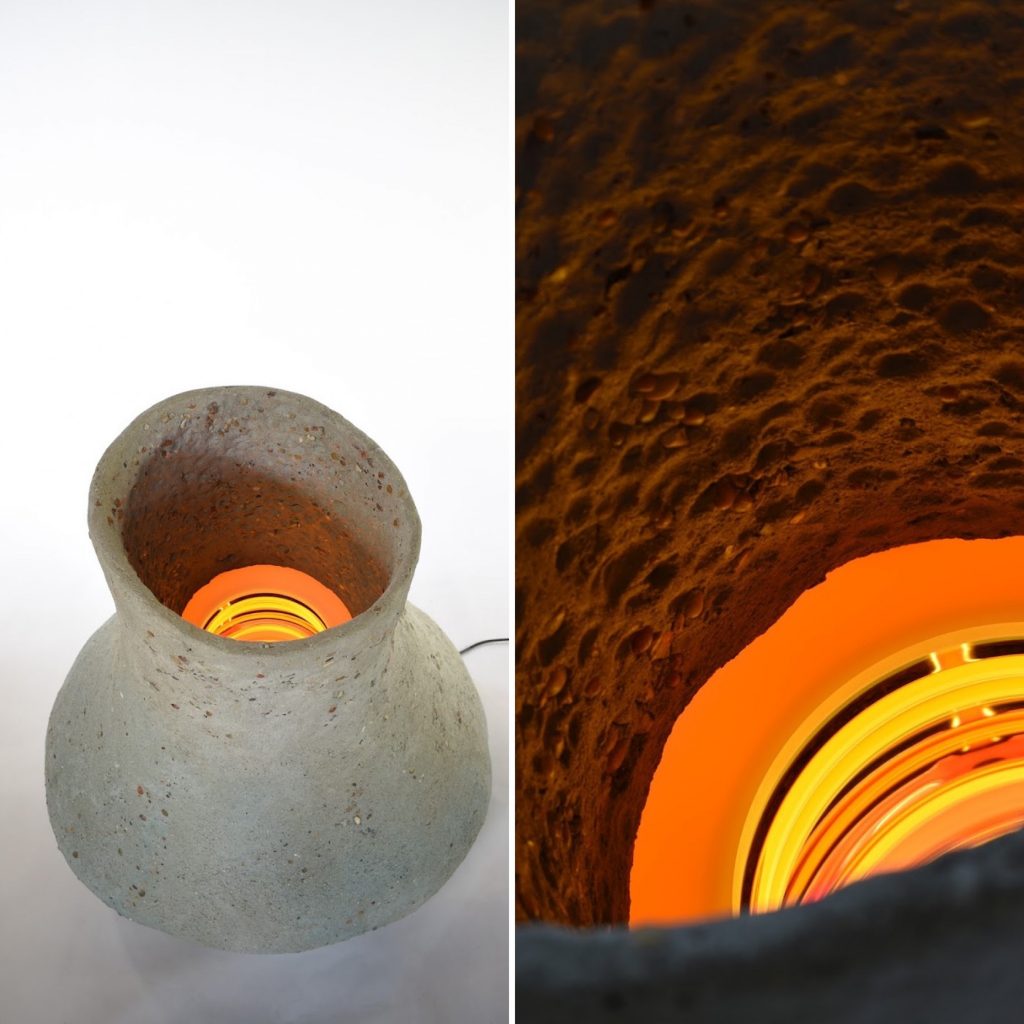
Matt Gagnon, Pot of Gold (2023). Courtesy of the artist.
“This series started with this idea of making volcanoes,” he explains. But now, “It feels more like a pot of gold. The light is hidden in the interior. It harkens to this idea of spiritual or mystical energy and the idea of interior versus exterior and what we see as an object to be and then what we can learn or imagine about the object as we get to know it. It’s light and space encapsulated in this rough object.”
To Gagnon, the element of chance is an essential ingredient in all of his creations. Uncertainty is part of his methodology. “To speak quickly about the texture, putting aggregate in concrete, you don’t know the pattern you’re going to get,” he explains. “It’s allowing this arbitrary randomness of things to show through. it’s definitely me going, hey, I don’t need to be so uptight. And I don’t need to be so in control, and I should explore these things. It’s moving away from the design background that I’ve had and into the more kind of physical touch-making I want to do.”
Born in Connecticut, Gagnon moved with his family to North Carolina and spent the majority of his childhood there. Curiosity and creativity sparked early forays into art. By the age of 12 he was making sculptures in the family’s yard.
“I tore down the mailbox and remade it as a sculpture,” he recalls. “The neighbors were horrified, but my parents were cool with it.” Architecture seemed the next logical step. “As a younger person, I needed function as an excuse for a thing to exist.”
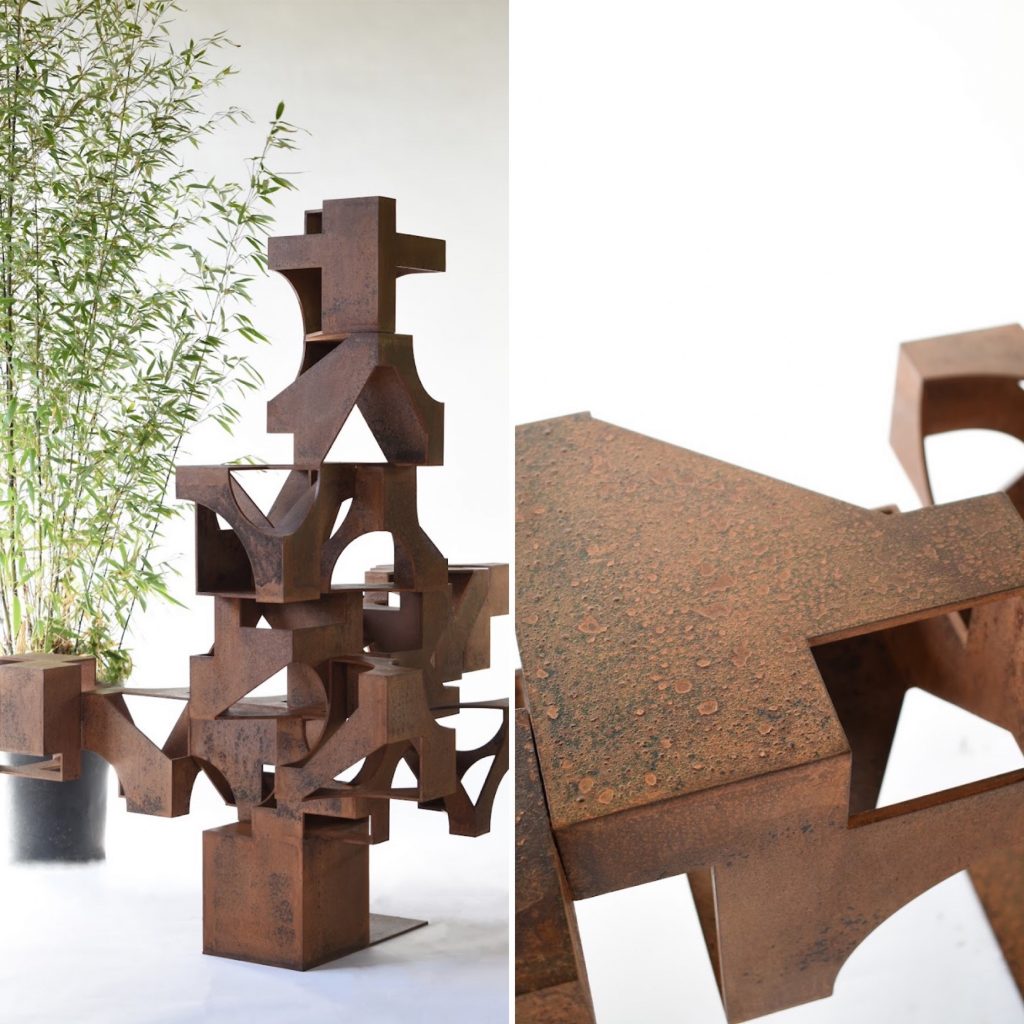
Matt Gagnon, With weight low to the ground (2023). Courtesy of the artist.
Gagnon studied and performed ballet while earning his architecture degree at Cornell University. “For my thesis, I inhabited a sculpture for two months,” he says. “I’ve always been thinking about the scale of the body and how the body relates to things.”
After stints working for both Gaetano Pesce and Frank Gehry he set out on his own. Art started to dominate his creative output. “That idea of architecture is this pure expression of form, light, volume, shadow, and choreography of movement,” he says. “But the reality of it is building codes and angry clients. It’s not the pureness that I had always dreamed and wanted it to be.”
Sculpture continues to speak to him. “I’m drawn to sculpture because you have to experience it if it’s good,” Gagnon explains. “You have to experience it in relationship to yourself. How it makes you feel small or big, all those things become a way of choreographing movement. You put something in the middle of a space, people move around it. it changes the way the space feels. It anchors the space, it alters the energy. Making sculpture for me is thinking about how it interacts with the observer.”
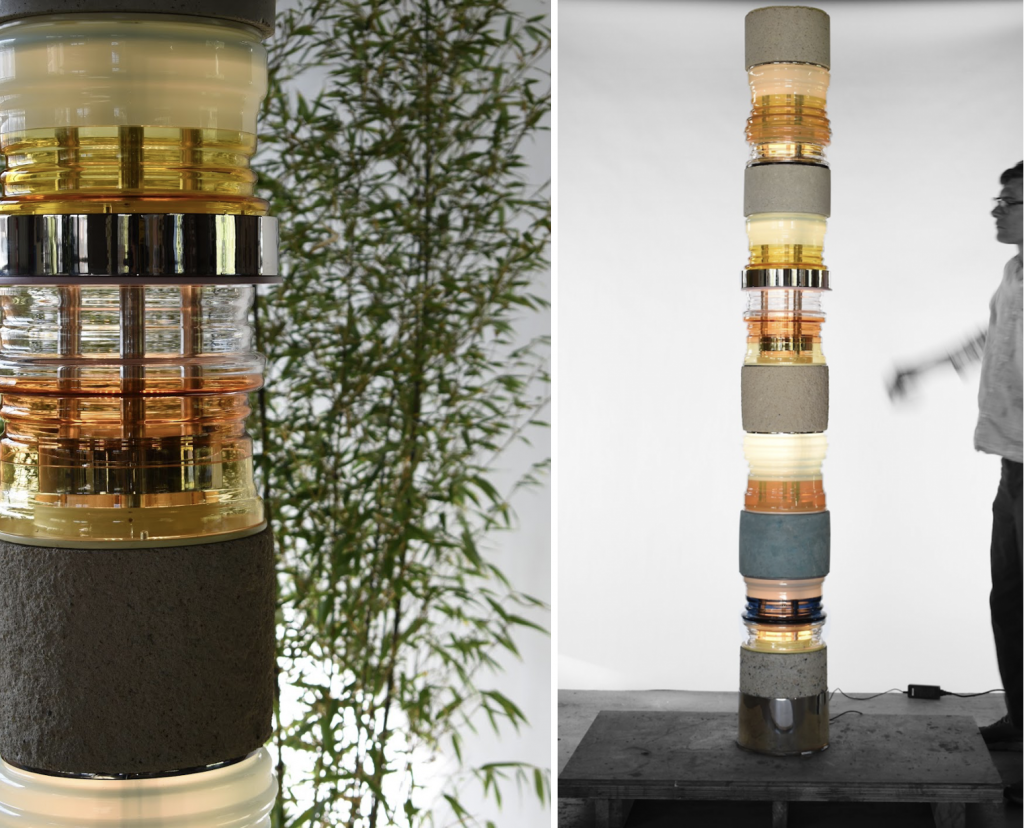
Matt Gagnon, Sometimes in the sky (2023). Courtesy of the artist.
Gagnon finds inspiration in nature, or as he explains it: “Phenomenal effects, like, going for a hike and seeing the light come through the layers of texture in nature and throwing a shadow onto the rocky pathway and you go, ‘Whoa, that is so incredible’ in that moment.”
He continues, “The more we can celebrate our present existence of life is wonderful. My inspiration comes from seeing nature and then experiencing the built environment. I’m still looking at architecture and spaces and how light and shadow play and I guess back to this idea of the rough versus the smooth—it’s that interface, between the built and the natural and the unplanned, that edge, that interests me.”
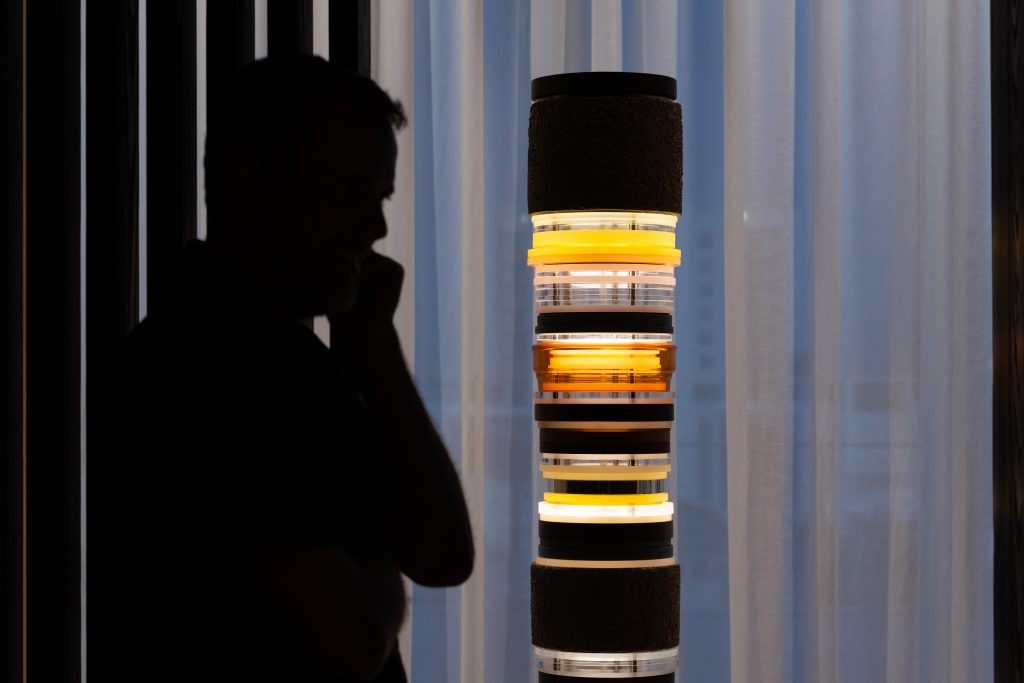
Matt Gagnon’s Gray Blue (2023) all aglow inside Gaggenau’s Miami Design District showroom. Courtesy of Gaggenau.